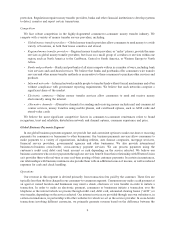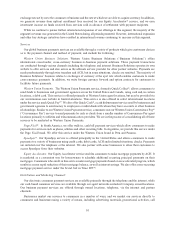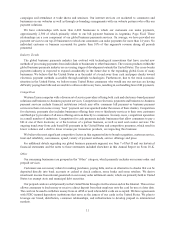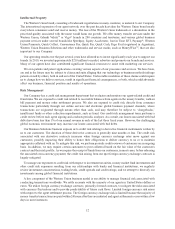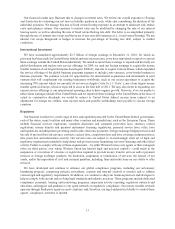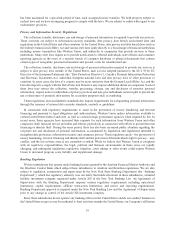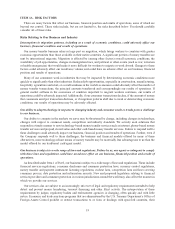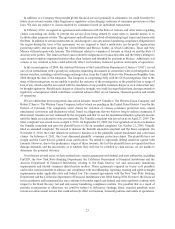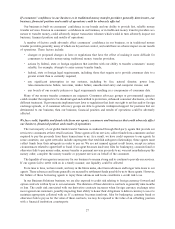Western Union 2010 Annual Report Download - page 21
Download and view the complete annual report
Please find page 21 of the 2010 Western Union annual report below. You can navigate through the pages in the report by either clicking on the pages listed below, or by using the keyword search tool below to find specific information within the annual report.ITEM 1A. RISK FACTORS
There are many factors that affect our business, financial position and results of operations, some of which are
beyond our control. These risks include, but are not limited to, the risks described below. You should carefully
consider all of these risks.
Risks Relating to Our Business and Industry
Interruptions in migration patterns, including as a result of economic conditions, could adversely affect our
business, financial condition and results of operations.
Our money transfer business relies in large part on migration, which brings workers to countries with greater
economic opportunities than those available in their native countries. A significant portion of money transfers are
sent by international migrants. Migration is affected by (among other factors) overall economic conditions, the
availability of job opportunities, changes in immigration laws, and political or other events (such as war, terrorism
or health emergencies) that would make it more difficult for workers to migrate or work abroad. Changes to these
factors could adversely affect our remittance volume and could have an adverse effect on our business, financial
position and results of operations.
Many of our consumers work in industries that may be impacted by deteriorating economic conditions more
quickly or significantly than other industries. Reduced job opportunities, especially in construction, manufacturing,
hospitality, agriculture and retail, or overall weakness in the world’s economies could adversely affect the number of
money transfer transactions, the principal amounts transferred and correspondingly our results of operations. If
general market softness in the economies of countries important to migrant workers continues, our results of
operations could be adversely impacted. Additionally, if our consumer transactions decline, if the amount of money
that consumers send per transaction declines, or if migration patterns shift due to weak or deteriorating economic
conditions, our results of operations may be adversely affected.
Our ability to adapt technology in response to changing industry and consumer needs or trends poses a challenge
to our business.
Our ability to compete in the markets we serve may be threatened by change, including changes in technology,
changes with respect to consumer needs, competition and industry standards. We actively seek solutions that
respond in a timely manner to new technology-based money transfer services such as internet, phone-based money
transfer services and prepaid, stored-value and other card-based money transfer services. Failure to respond well to
these challenges could adversely impact our business, financial position and results of operations. Further, even if
the Company responds well to these challenges, the business and financial models offered by many of these
alternatives, more technology-reliant means of money transfer may be materially less advantageous to us than the
model offered by our traditional cash/agent model.
Our business is subject to a wide range of laws and regulations. Failure by us, our agents or subagents to comply
with those laws and regulations could have an adverse effect on our business, financial position and results of
operations.
As described under Item 1 of Part I, our business is subject to a wide range of laws and regulations. These include
financial services regulations, consumer disclosure and consumer protection laws, currency control regulations,
money transfer and payment instrument licensing regulations, escheat laws, competition laws and laws covering
consumer privacy, data protection and information security. New and proposed legislation relating to financial
services providers and consumer protection in various jurisdictions around the world may also affect the manner in
which we provide our services.
Our services also are subject to an increasingly strict set of legal and regulatory requirements intended to help
detect and prevent money laundering, terrorist financing and other illicit activity. The interpretation of those
requirements by judges, regulatory bodies and enforcement agencies is changing, often quickly and with little
notice. Economic and trade sanctions programs that are administered by the U.S. Treasury Department’s Office of
Foreign Assets Control prohibit or restrict transactions to or from or dealings with specified countries, their
19


